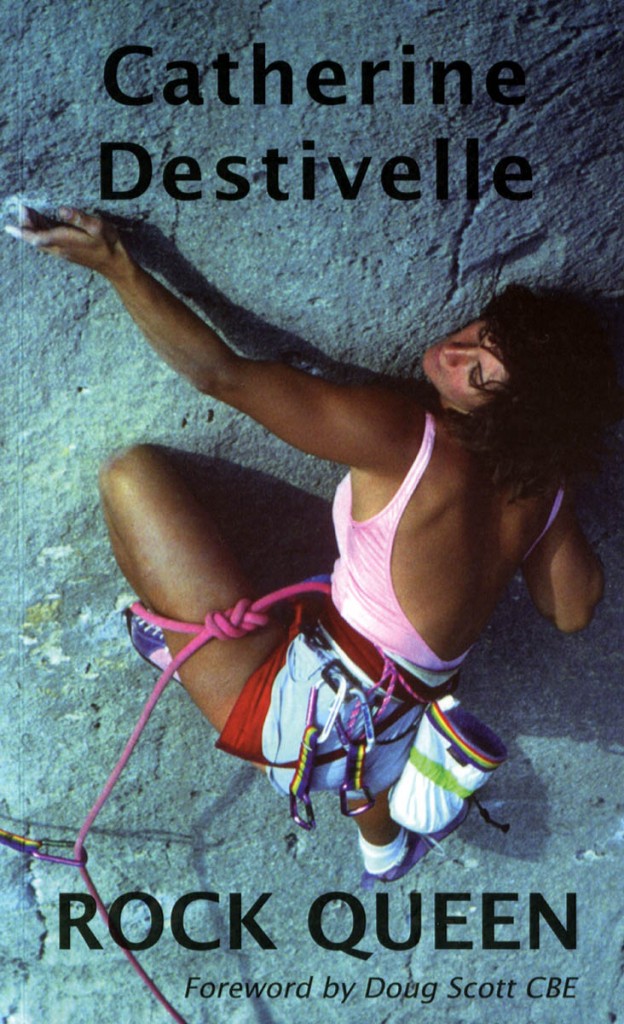Anyone with their finger on the pulse of modern climbing will be familiar with the name of Catherine Destivelle and will no doubt be aware of the numerous first ascents she has achieved.
But for many, she remains just a name linked with a list of climbs and perhaps a viewing of a film seen at some mountain festival.
This book, a translation from her French autobiography, presents the back-story to her career, and offers an insight into her character, personality and the reasons for doing what she did.
It is told in a matter-of-fact way, and the translator has kept largely to the style of the original.
It opens with an almost dispassionate account of an accident when climbing Peak 4111 in Antarctica with her husband-to-be Éric Decamp in which she badly broke her leg and was helped from the remote mountain after days in the sub-zero wilderness.
Destivelle then moves back to the beginnings of her love of alpinism, her rebellious nature leading to surreptitious trips to the Alps from her suburban Paris home, when her parents actually believed she was only on the other side of the city in Fontainebleau. It soon becomes clear she was able to climb better than her instructors.
An enthusiasm bordering on the reckless is tempered as she enters a new age to become a professional climber.
Yet, disillusioned with the insular world of the climbing community, she is introduced into the world of gambling and poker by fellow alpinist Jérôme Jean-Charles. There follows a descent into a time she describes as going off the rails, with episodes of smoking and weight gain. There’s a hint perhaps of the obsessive nature that will later drive her to tackle some of the most difficult climbs attempted by a woman.
After a period working as a physiotherapist, she works hard to regain her fitness and improve her climbing technique.
Despite previously signing a declaration against sport climbing, she is persuaded to participate in a competition and naturally excels before another fall, this time into a crevasse, puts her in hospital with a broken hip.
After recovering, more success and a little help from a friend lead her to sign commercial deals with several companies, cementing her role as a professional climber.
She is filmed on her first trip to the Karakorum, climbing the Trango Towers with Jeff Lowe. Two years later, she would join him again in an aborted attempt on the North Ridge of Latok I.
For would-be great climbers, there are hints on philosophy from Destivelle. She says: “When I climb without a rope, I need to maintain a good safety margin to feel secure, otherwise fear mars my enjoyment.”
It’s interesting to learn she also listens hard while climbing: “One little grain of sand under the soles can be detected by a tiny crunching sound which alerts to the possibility of slipping.”
Returning to the Alps, she successfully completes an 11-day solo climb of the Aiguille du Dru by a new route. In the book, she discusses the inner conflict she feels of being a professional climber and earning the opprobrium of some others in the sport.
Then it’s time to move on from being a rock-climber to a true mountaineer, with her solo ascent of the North Face of the Eiger, achieved in 17 hours, to be met at the summit by Jeff Lowe in his sleeping bag, having taken an easier route to the top. She feels she has finally been accepted as an alpinist.
As her fame grows, so does her loneliness as she feels a distance opening up between her and her old climbing friends.
Bad weather and altitude problems prevent her from climbing Makalu. She declares she has no interest in climbing Everest as she prefers to climb difficult technical routes without supplementary oxygen.
Returning to Europe, Destivelle posts hard routes on the Matterhorn and the Grandes Jorasses. These are recounted in her matter-of-fact, unboastful style.
This unpretentious autobiography contains no huge deep philosophical insights, merely the fact that this talented climber is happiest and most contented when tackling a difficult technical rock climb. Climbing is not the be all and end all, she says, but a means to enjoyment. The challenge of these, and overcoming the difficulties, is what gives her fulfilment in life.
Rock Queen is published by Hayloft Publishing, £12.

Jon
28 April 2016Makalu is not the world's third highest mountain. Everest, K2, Kangchenjunga and Lhotse are all higher, and even if one considered Lhotse to be insufficiently separate from Everest, Makalu would be fourth. Most people consider Makalu to be the fifth highest mountain in the world.
Bob
28 April 2016Thanks for pointing out our error, Jon. The review has been amended to remove the description of Makalu as the world's third highest peak.
Apologies for the mistake.